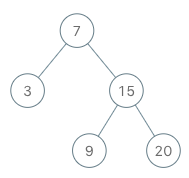LeetCode 솔루션 분류
173. Binary Search Tree Iterator
본문
[ Medium ] 173. Binary Search Tree Iterator
Implement the BSTIterator class that represents an iterator over the in-order traversal of a binary search tree (BST):
BSTIterator(TreeNode root)Initializes an object of theBSTIteratorclass. Therootof the BST is given as part of the constructor. The pointer should be initialized to a non-existent number smaller than any element in the BST.boolean hasNext()Returnstrueif there exists a number in the traversal to the right of the pointer, otherwise returnsfalse.int next()Moves the pointer to the right, then returns the number at the pointer.
Notice that by initializing the pointer to a non-existent smallest number, the first call to next() will return the smallest element in the BST.
You may assume that next() calls will always be valid. That is, there will be at least a next number in the in-order traversal when next() is called.
Example 1:

Input ["BSTIterator", "next", "next", "hasNext", "next", "hasNext", "next", "hasNext", "next", "hasNext"] [[[7, 3, 15, null, null, 9, 20]], [], [], [], [], [], [], [], [], []] Output [null, 3, 7, true, 9, true, 15, true, 20, false] Explanation BSTIterator bSTIterator = new BSTIterator([7, 3, 15, null, null, 9, 20]); bSTIterator.next(); // return 3 bSTIterator.next(); // return 7 bSTIterator.hasNext(); // return True bSTIterator.next(); // return 9 bSTIterator.hasNext(); // return True bSTIterator.next(); // return 15 bSTIterator.hasNext(); // return True bSTIterator.next(); // return 20 bSTIterator.hasNext(); // return False
Constraints:
- The number of nodes in the tree is in the range
[1, 105]. 0 <= Node.val <= 106- At most
105calls will be made tohasNext, andnext.
Follow up:
- Could you implement
next()andhasNext()to run in averageO(1)time and useO(h)memory, wherehis the height of the tree?
관련자료
-
링크
댓글 3
mingki님의 댓글
- 익명
- 작성일
C++
Runtime: 48 ms, faster than 27.69% of C++ online submissions for Binary Search Tree Iterator.
Memory Usage: 24.3 MB, less than 10.53% of C++ online submissions for Binary Search Tree Iterator.
Runtime: 48 ms, faster than 27.69% of C++ online submissions for Binary Search Tree Iterator.
Memory Usage: 24.3 MB, less than 10.53% of C++ online submissions for Binary Search Tree Iterator.
class BSTIterator {
vector<int> arr;
int idx;
void buildArr(TreeNode* root) {
if (root) {
buildArr(root->left);
arr.push_back(root->val);
buildArr(root->right);
}
}
public:
BSTIterator(TreeNode* root) {
buildArr(root);
idx = 0;
}
int next() {
return arr[idx++];
}
bool hasNext() {
return idx < arr.size();
}
};9dea0936님의 댓글
- 익명
- 작성일
class BSTIterator:
def __init__(self, root: Optional[TreeNode]):
head = root
def dfs(head):
return dfs(head.left) + [head.val] + dfs(head.right) if head else []
self.ans = dfs(root)
self.iter = 0
self.lenLst = len(self.ans)
print(self.ans)
def next(self) -> int:
if self.iter < self.lenLst:
temp = self.ans[self.iter]
self.iter += 1
return temp
def hasNext(self) -> bool:
if self.iter < self.lenLst:
return True
else:
return False
bobkim님의 댓글
- 익명
- 작성일
Runtime: 31 ms, faster than 76.77% of C++ online submissions for Binary Search Tree Iterator.
Memory Usage: 25.5 MB, less than 6.08% of C++ online submissions for Binary Search Tree Iterator.
Memory Usage: 25.5 MB, less than 6.08% of C++ online submissions for Binary Search Tree Iterator.
class BSTIterator {
private :
int n=0;
std::vector<TreeNode*> TreeNodeVec;
public:
BSTIterator(TreeNode* root) {
Treesort(root);
}
void Treesort(TreeNode* p){
if(p == nullptr){
return;
}
if(p->left != nullptr)
Treesort(p->left);
TreeNodeVec.push_back(p);
if(p->right != nullptr)
Treesort(p->right);
}
int next() {
n++;
return TreeNodeVec[n-1]->val;
}
bool hasNext() {
return TreeNodeVec.size() >= n+1;
}
};










